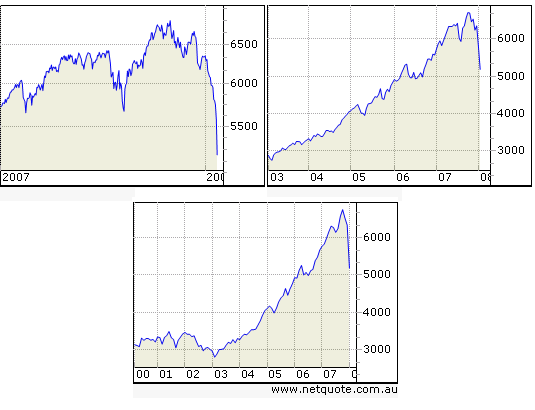Chart of the Day - Wednesday 23rd January 2008
Posted by Phil Hart on January 22, 2008 - 9:20am in The Oil Drum: Australia/New Zealand
The stock market avoided facing reality for most of 2007, but most of us would agree that we have now turned a corner, or passed a peak of a different kind. Not just another 'correction', we're now officially in a 'bear' market.

Whether you look at it over one year, five years or ten years, it's pretty clear that this market slump is unprecedented, presumably as far back as the 1987 crash.
I started telling people to be careful with stocks at the end of 2006. I expected this kind of crash way back then, and had to question my own judgement as the market kept soaring to new heights all through last year.
Now that we've fallen back to levels of November 2006, I can feel a bit more smug about my decision to stay out of the market. However, that we've still only fallen to 2006 levels says to me that we've still got further to fall, since the market seemed ready for a fall way back then.
What do you think? How far down is the bottom of this ride?
Lest you should think this is not directly related to peak oil, I wrote a piece on the Shares Slump and Credit Crunch back in August last year, giving my view on how the two are linked.




I am no share market guru, but it seems that there are (at least) two basic principles that affect share prices.
First, any given share will have a value based on its potential to earn a dividend. A company that increases its productivity should start paying bigger dividends per share, and the shares in that company should therefore increase in value accordingly. And vice versa.
Second, a share will have a value based on its perceived rate of appreciation in value. This is thanks to the rapid buy-sell Wall Street phenomenon, in which people are not interested in investing to earn a dividend, but are interested in buying a share one day and selling it for more money a short time later. This behaviour creates the 'bursting bubble' phenomenon, where the price rises to a level out of all proportion to the dividend, and then crashes back to its true level.
So... If we're thinking about how low it could go, then one sort of 'end member' would be to suggest that the entire stock market might collapse to the point where the value of all shares was close to their 'true' value.
I guess the Peak Oil link comes in as the costs of essential goods and services rise, meaning overall demand for unnecessary goods and services should be expected to decline. Certain companies will experience a decline in demand, will be unable to maintain profits and their dividends will therefore fall. Falling dividends could trigger a negative bubble effect, where everyone suddenly tries to rid themselves of their shares in those companies and the share price drops to rock-bottom. I guess this is what distinguishes a 'crash' from a mere 'correction'?
This Bear Market will seem like the good old days once fuel rationing comes in and investors no longer have confidence that they system will provide them with the security they crave.
Peak oil in 05 and Peak coal in 25 provides little in the way of evidence that our lifestyle is secure - IMHO once that information settles within the consciousness of the investing public then we are in for free fall - and those who accessed their super prior to 2010 and invested it in something really sustainable will continue to thank their lucky stars!!!
I agree completley. I had a heated argument with my "financial adviser" in early December about rejigging my super account get it all into a cash account pending us working out how to get it into gold. The FA told me I was panicking and that the market had never looked so good. "Chindia was going to make the boom go on forever" he said. I stuck to my guns and insisted that all managed funds be cashed out. Which he did. Lucky.
I have never really taken much interest in my superannuation, probabaly like a lot of people who are not nearing retirement anytime soon. But my education here at TOD got me thinking a while back about where it was invested. My profile was aggressive investing which means my little stash was highly exposed to a crash. It was great while it went up. As I said i wasn't much but it had grown quite a bit in the last couple of years adn I didn't relish the idea of losing it. Is till don't and see gold as the only form of currency that will maintain its buying power, regardless of its nominal value.
The trouble with most retail super funds is that they can't get an ongoing fee for investing in gold. There is no income for them to siphon off the fees so they just don't do it. They spin this rubbish that gold is not a good investment, and I do agree, gold is not an investment, it is the ultimate cold hard cash, while dollars are decideldy less hard and warmer.
Despite the big rallys of Wednesday and today, I think that there is more losses to come. They will probabaly not be as dramatic, 20 points here, 30 points there, up 5, down 15 etc. The way Ben and George are splashing round the cash, there is only one way for the USD to go and that is down.